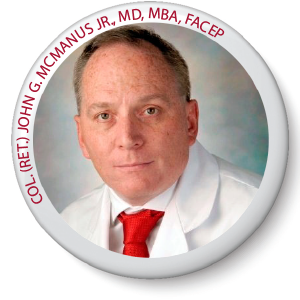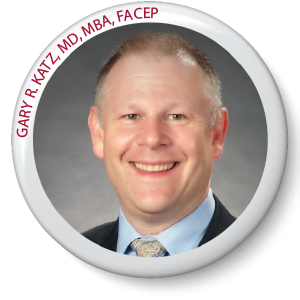
Each October at ACEP’s annual Council meeting, the ACEP Council elects new leaders for the College. The Council, which represents all 53 chapters, 37 sections of membership, the Association of Academic Chairs in Emergency Medicine, the Council of Emergency Medicine Residency Directors (CORD), the Emergency Medicine Residents’ Association (EMRA), and the Society for Academic Emergency Medicine, will elect the College’s President-Elect, four members to the ACEP Board of Directors, and the Council Vice Speaker. This month, we’ll meet the Council officer candidates.
Explore This Issue
ACEP Now: Vol 36 – No 10 – October 2017Platform Statements
The Council officer candidates responded to this question:
Discuss the similarities and differences in the skill sets of the Council officers and Board of Directors. Describe your skills, background, knowledge, or unique abilities that will make you an effective Speaker or Vice Speaker.
Council Speaker
The following member is a candidate for ACEP Council Speaker.
 Col. (ret.) John G. McManus Jr., MD, MBA, FACEP (Government Services)
Col. (ret.) John G. McManus Jr., MD, MBA, FACEP (Government Services)
Current Professional Positions: EMS fellowship director and professor of emergency medicine, Georgia Regents University, Augusta
Internships and Residency: transitional internship, Eisenhower Army Medical Center, Augusta, Georgia; chief resident, emergency medicine, Fort Lewis, Washington
Medical Degree: MD, Medical College of Georgia (1992)
Response
After serving for more than 15 years on the Council and the last two years as the Vice Speaker, I have come to recognize that most of the Council possess leadership skill sets. The Board of Directors and Council officers are very collaborative in nature and possess the obvious characteristics of leaders. As elections occur, often the Council will place certain leadership traits higher than others to balance out opinion and promote diversity for society decision making.
My own leadership background is diverse and unique in many ways. I’ve spent several years working in both medicine and the military for many great leaders, and much to my surprise, the leaders at most of my jobs did not fit commonly espoused theories of leadership. Although several of my previous leaders and mentors were charismatic, possessed a commanding presence, were visionary, and were educated at elite schools, the most successful of these were servant leaders. Over the past two decades, as I have moved up in the leadership ranks, I have relied on being a servant leader as one of my most prized qualities to build consensus, motivate colleagues and peers, and mentor future medical providers off and on the battlefield. A servant leader is one who leads by example and is people-centric. This leader values service to others and believes they have a duty of stewardship. I tend to be a humble but passionate operator in my organizations who believes every member should be treated with equal respect and their opinions valued.
These qualities of servant leadership have served me well and will be ideal to aid in running a successful Council. To be able to devote myself to serving the needs of the individual councillor allows me to focus on meeting the needs of the Council itself. This leadership skill helps develop individual members to bring out the best in themselves and encourages self-expression, facilitates personal growth, and builds a sense of community and joint ownership. Servant leaders are felt to be effective because the needs of followers are so looked after that they reach their full potential and, hence, perform at their best. I really look at this leadership trait as working for the Council rather than leading it, per se. The strength of this way of looking at leadership is that it forces one away from self-serving, domineering leadership and makes one who is leading think harder about how to respect, value, and motivate people working with them. I look forward to the potential opportunity to serve the Council in this capacity.
Council Vice Speaker
The following members are candidates for ACEP Council Vice Speaker.
 Sabina Braithwaite, MD, MPH, FACEP, FAEMS (Missouri)
Sabina Braithwaite, MD, MPH, FACEP, FAEMS (Missouri)
Current Professional Positions: associate professor of emergency medicine and EMS fellowship director, Washington University in St. Louis; clinical educator, Teleflex
Internships and Residency: medical internship, Medical College of Virginia, Richmond; emergency medicine residency, Medical College of Hampton Roads, Norfolk
Medical Degree: MD, Medical College of Virginia (1991)
Response
Both Council officers and Board members must maintain awareness of issues facing not only the organization itself but emergency medicine in general so they are best able to facilitate ACEP’s mission to support quality emergency care and promote the interests of emergency physicians. Both groups must be able to:
- entertain views on various sides of the issues
- step back and look through the lens of the organization or the profession, not solely their personal opinion
- recognize their fiduciary responsibility to the organization and its members
At the most basic level, Council officers are primarily being asked to use their meeting management skills to constructively lead a fast-paced, intense, and often passionate and emotionally charged meeting to a productive conclusion reflective of the will of the Council. Their job is to bring hundreds of voices into one with a sense of community with the Council as well as a sense of humor. Their responsibility carries forward between Council meetings in their work with the Steering Committee, looking for ways for the Council to be most effective in being the voice of the membership, and working with the Board to accomplish the organization’s priorities as identified in the annual meeting. In contrast, the Board is a contemplative team that thoughtfully and thoroughly reviews, considers, and responds to issues facing the organization, the members, and our field of practice, with a considerably different timeline than the Council.
Council officers are charged with collating, focusing, and amplifying the collective opinion of the Council representatives, who in turn represent the full ACEP membership on the front lines of emergency medicine. These opinions, in the form of passed resolutions and referred issues, form the “marching orders” that then guide the Board’s work on behalf of the membership until the next Council meeting.
 Andrea Green, MD, FACEP (Texas)
Andrea Green, MD, FACEP (Texas)
Current Professional Positions: staff physician, Emergency Service Partners/US Acute Care Solutions, travel team
Internships and Residency: residency, Howard University Hospital Emergency Medicine, Washington, D.C.; residency, Sparrow Hospital/University of Michigan Emergency Medicine Program, Lansing
Medical Degree: MD, University of Iowa College of Medicine (1979)
Response
Our Council officers and Board of Directors share the same high-level leadership skill sets. It is the differences in their responsibilities that will dictate utilization of specific skills. The Council officers, charged with speaking for and representing the interests of the Council, will use skills working with the Council to craft resolutions, lead large group discussions, lead timely Council meetings, manage committees, and solve problems collaboratively. The Board of Directors, with responsibility for governance of the organization and setting policy, will use specific skills for fiduciary expertise, strategic vision, policy development, and building quality networks and relationships with organizations. Regardless of the role, both must use their skills to work collaboratively to advance the goals and values of ACEP.
My experiences as President of the Texas College of Emergency Physicians (TCEP), Chair of TCEP committees, emergency department(s) Chair, director of a junior college EMS program, director of a 12-hospital domestic violence program, and CEO of an emergency physician group are but a few career roles that have permitted me the opportunity to develop expertise and successfully demonstrate all of the leadership skills needed for Vice Speaker. My skills include the ability to shape and lead timely and productive group meetings, manage committees, negotiate agreements, problem solve collaboratively, and create policies. I am familiar with parliamentary procedure and am comfortable bringing order and closure to discussions.
I am able to use these skills to serve you. My goals include providing orderly but engaging Council experiences, working to implement effective virtual resolution chat rooms, exploring paths for sharing the Council meetings with colleagues back home (perhaps live streaming), expanding high-tech avenues to facilitate Councillors’ participation in multiple reference committees simultaneously, and developing more mentoring and leadership training opportunities for EMRA on Council committees.
I look forward to the opportunity to serve you.
 Gary R. Katz, MD, MBA, FACEP (Ohio)
Gary R. Katz, MD, MBA, FACEP (Ohio)
Current Professional Positions: chief medical officer, Family Care Partners, Varsity Healthcare; assistant professor and program director, administration fellowship, department of emergency medicine, The Ohio State University, Columbus
Internships and Residency: emergency medicine residency, Summa Health System, Akron, Ohio; emergency medicine internship, Summa Health System
Medical Degree: MD, Medical College of Ohio (1998)
Response
Council officers play an essential role that both mirrors and diverges from that of the Board. Both must create unifying messages and strengthen our ACEP. While this might be easier in times of consensus, it is during times of disparity the Council officers must apply their unique skills, facilitating dialogue to create action where agreement can be fashioned.
Creating harmony in times of conflict requires assurance that the majority’s will is followed while the minority’s rights remain protected. Resolution of these competing forces is founded in parliamentary procedure, a skill I have studied and applied. I served as Speaker, while Chair of the American Medical Association (AMA) Young Physicians Section and chaired the AMA’s finance and governance committee, where I ran assemblies like our ACEP Council.
However, fairness and justice must be exhibited by more than employing parliamentary procedure. The traits of fostering dialogue must be exhibited year-round, assuring that membership voices are developed with broad participation. Such opportunities exist in growing social communities where peers share insight, experiences, frustrations, and solutions to our challenges. No longer are we limited to interacting infrequently. Through ongoing discourse, we can reach beyond facile understanding and create critical solutions that carry a national input and support.
I was privileged to serve two terms as Ohio ACEP President. During these terms, I employed these communication principles to lead our chapter’s growing education and advocacy missions. This has yielded sustained increases in member engagement. This philosophy of outreach reflects what we would also desire in a Board member.
Our Council remains the best channel to strengthen the voice of ACEP’s membership and further the cause of emergency medicine. The duties of the Council officers carry unique requirements to achieve success. I’m happy to bring expertise that will marry Board of Directors and Speaker skills to be a strong voice for you.
Pages: 1 2 3 4 | Multi-Page





No Responses to “2017 ACEP Elections Preview: Meet the ACEP Council Officer Candidates”